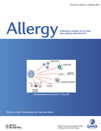
ALLERGY
Scope & Guideline
Illuminating Innovations in Allergy and Immunology.
Introduction
Aims and Scopes
- Allergic Disease Mechanisms:
Research on the immunological and molecular mechanisms underlying various allergic diseases, including asthma, allergic rhinitis, and food allergies. - Immunotherapy Advances:
Studies focusing on the efficacy and safety of allergen immunotherapy, including subcutaneous, sublingual, and epicutaneous routes, as well as innovations in vaccine development. - Biologics in Allergy Treatment:
Investigations into the use of biological therapies, such as monoclonal antibodies targeting specific pathways in allergic diseases, particularly in severe cases. - Environmental and Genetic Factors:
Research examining the impact of environmental factors, including air pollution and climate change, as well as genetic predispositions in the development and exacerbation of allergic diseases. - Clinical Management and Guidelines:
Publications that provide insights into best practices for the management of allergic diseases, including the development and updates of clinical guidelines. - Quality of Life and Patient-Centered Research:
Studies assessing the impact of allergic diseases on patients' quality of life and the effectiveness of various treatments from the patient's perspective.
Trending and Emerging
- Microbiome and Allergies:
An increasing number of studies are exploring the connection between the microbiome and allergic diseases, highlighting the role of gut and skin microbiota in modulating immune responses. - Personalized Medicine:
There is a significant trend towards personalized medicine in allergy treatment, focusing on tailoring therapies based on individual patient profiles, including genetic and immunological factors. - Digital Health and Technology:
The integration of digital health technologies, such as mobile applications and telemedicine, in managing allergies and enhancing patient engagement is rapidly expanding. - Environmental Impact on Allergies:
Research examining the effects of climate change and environmental pollutants on the prevalence and severity of allergic diseases is becoming increasingly prominent. - Food Allergy and Immunotherapy Innovations:
Innovative approaches to food allergy treatment, including oral immunotherapy and the use of biologics, are emerging as key areas of interest in the field. - Long-COVID and Allergic Conditions:
The relationship between COVID-19 and allergic diseases, including the long-term effects of viral infections on allergy prevalence and severity, is a trending topic following the pandemic.
Declining or Waning
- Traditional Allergen Identification:
There is a noticeable decrease in studies solely focused on traditional methods of allergen identification, as newer, more sophisticated molecular techniques are being adopted. - Basic Mechanistic Studies:
Research that solely focuses on basic mechanisms of allergic responses without translational or clinical implications appears to be declining, as there is a stronger emphasis on clinically relevant findings. - Single Allergen Studies:
The focus on studies investigating single allergens in isolation is waning, as the field is moving towards a more integrative approach that considers multiple allergens and their interactions. - Historical Allergy Treatments:
Interest in historical treatments and outdated practices for managing allergies is decreasing, particularly as new therapies and approaches gain traction. - Generalized Epidemiological Studies:
General population-based studies on allergies without specific insights or interventions are being overshadowed by more targeted research focusing on specific populations or conditions.
Similar Journals
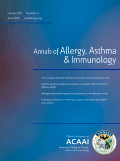
ANNALS OF ALLERGY ASTHMA & IMMUNOLOGY
Charting New Territories in Respiratory Health ResearchANNALS OF ALLERGY ASTHMA & IMMUNOLOGY is a premier peer-reviewed journal published by Elsevier Science Inc, dedicated to advancing the fields of allergy, asthma, and immunology. With its roots dating back to 1995 and with a focus on high-impact research, this journal has established itself as a leading platform for the dissemination of original research, reviews, and clinical studies within these critical areas. The journal boasts an impressive impact factor, supporting its Q2 ranking in both Immunology and Allergy, as well as in Pulmonary and Respiratory Medicine, indicating its significant contribution to the scientific community. Although it does not currently offer open access options, its comprehensive coverage and rigorous peer-review process ensure that published articles are of the highest quality, making it an invaluable resource for researchers, clinicians, and students alike. The Scopus rankings reflect its esteemed position in the academic landscape, providing professionals with access to cutting-edge developments and insights into the management and treatment of allergic and respiratory conditions.

ASIAN PACIFIC JOURNAL OF ALLERGY AND IMMUNOLOGY
Bridging the gap between research and clinical practice.The ASIAN PACIFIC JOURNAL OF ALLERGY AND IMMUNOLOGY, published by the Allergy Immunology Society of Thailand, is a pivotal platform for disseminating high-quality research in the fields of allergy and immunology. Established in 1983, this journal has consistently evolved to address the pressing challenges and advancements in these dynamic disciplines, contributing significantly to the global scientific community's understanding of immunological disorders. With a category ranking of Q3 in Immunology and Allergy, and Q2 in Medicine (miscellaneous) for 2023, the journal stands at the forefront of impactful research, engaging with a diverse audience of researchers, clinicians, and students alike. Although it operates on a non-open access model, its rigorous peer-review process ensures that published articles meet the highest academic standards. Located in Bangkok, Thailand, the journal connects researchers across the Asia-Pacific region, fostering collaboration and innovation to enhance patient care in the realm of allergy and immunology.

Alergia Astma Immunologia
Elevating discourse in the fields of allergy and asthma.Alergia Astma Immunologia is a dedicated journal focusing on the interdisciplinary fields of immunology and respiratory medicine, published by the Asthma and Allergy Patients Support Organization in Poland. With a commitment to advancing research and sharing knowledge, this journal serves as a platform for scholars and practitioners to discuss critical issues and recent advances in allergy, asthma, and immunological disorders. Despite being in Category Quartiles Q4 for both Immunology and Allergy and Pulmonary and Respiratory Medicine, its importance is highlighted by its continuous publication since 2000, providing a historical perspective on evolving scientific insights. Researchers and clinicians alike benefit from accessing novel findings and case studies that contribute to improved patient outcomes and innovative therapeutic strategies. While the journal currently offers limited open access, its commitment to providing high-quality, peer-reviewed content ensures its relevance in the academic discourse within these vital areas of health science. The journal aims to foster collaboration, stimulate research interest, and promote evidence-based practices within the professional community.

Asia Pacific Allergy
Advancing Allergy Insights Across the Asia PacificAsia Pacific Allergy, published by Lippincott Williams & Wilkins, is a prominent academic journal dedicated to advancing research and clinical practice in the fields of dermatology, immunology, and allergy. With its ISSN 2233-8276 and E-ISSN 2233-8268, the journal provides a platform for innovative studies and reviews that cater to an international audience of researchers, healthcare professionals, and students involved in allergy and related disorders. Although it does not currently offer open access to its publications, the journal's robust output from 2015 to 2017 and its ongoing contribution to the literature from 2021 to 2024 showcase the evolving landscape of allergy research in the Asia Pacific region. Recognized in the 2023 Journal Citation Reports, it holds a Q2 ranking in Dermatology and a Q3 ranking in Immunology and Allergy, while its Scopus ranks further emphasize its significance within these domains, positioning it among the top journals in the field. As a source of cutting-edge research, Asia Pacific Allergy plays a vital role in fostering collaboration and knowledge dissemination, ultimately assisting in the betterment of patient care and treatment strategies across the region.
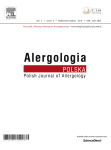
Alergologia Polska-Polish Journal of Allergology
Connecting experts to enhance understanding in allergology.Alergologia Polska - Polish Journal of Allergology, published by TERMEDIA PUBLISHING HOUSE LTD, is a distinguished academic journal dedicated to advancing the field of allergy research and treatment. With the ISSN 2353-3854, this journal serves as an essential resource for professionals, researchers, and students alike, offering a platform for the dissemination of novel findings and comprehensive reviews in allergic diseases. The journal emphasizes open access to ensure widespread availability and engagement within the scientific community. Alergologia Polska aims to enhance the understanding of allergy mechanisms, diagnostics, and management strategies, fostering collaboration and innovation among experts in the field. Set against the vibrant backdrop of Poznań, Poland, this publication not only highlights clinical and experimental research but also promotes interdisciplinary discussions that are pivotal for tackling complex allergic conditions globally.

Current Allergy & Clinical Immunology
Navigating the complexities of allergy and immunity.Current Allergy & Clinical Immunology is a vital peer-reviewed journal published by the Allergy Society of South Africa, focused on advancing the field of immunology and allergy medicine. With an ISSN of 1609-3607, this journal offers crucial insights and research findings pertinent to the understanding and treatment of allergic conditions. Operating from South Africa, it features contributions from a diverse range of authors and professionals in the field. Published from 2008 to 2024, the journal plays an essential role in disseminating current knowledge, even as it holds a Q4 ranking in Immunology and Allergy and is positioned at the 4th percentile based on Scopus rankings. While not open access, it remains an important resource for researchers, practitioners, and students looking to stay informed on emerging trends and breakthroughs in allergy and clinical immunology.

Postepy Dermatologii i Alergologii
Empowering discourse in dermatological and allergic research.Postepy Dermatologii i Alergologii is a distinguished Open Access journal published by TERMEDIA PUBLISHING HOUSE LTD, dedicated to advancing the fields of Dermatology and Immunology and Allergy. Since its inception in 2003, this journal has served as a vital platform for researchers and practitioners alike, promoting knowledge sharing and collaboration in Poland and beyond. With a current impact ranking placing it in the Q3 quartile for both Dermatology and Immunology and Allergy categories, it plays a significant role in contributing to academic discourse within these fields. The journal is indexed in Scopus, with respectable rankings reflecting its relevance and quality—#65/142 in Dermatology and #163/233 in Immunology and Allergy. Researchers are encouraged to explore a vast array of innovative studies and reviews, making it an essential resource for anyone seeking to stay at the forefront of dermatological and allergic research. For those interested in discovering groundbreaking findings and contributing to the ongoing dialogue in these disciplines, Postepy Dermatologii i Alergologii offers not only free accessibility but also a commitment to scholarly excellence.

Frontiers in Allergy
Transforming understanding of allergic disorders.Frontiers in Allergy is a pioneering open-access journal published by FRONTIERS MEDIA SA, dedicated to advancing the frontiers of research in the fields of Immunology and Infectious Diseases. Launched in 2020 and based in Lausanne, Switzerland, this journal provides a dynamic platform for researchers, professionals, and students to share innovative findings and insights related to allergic disorders and their broader immunological implications. With a respectable Q2 ranking in both Immunology and Allergy and Infectious Diseases categories, as well as being indexed in Scopus, this journal is emerging as a significant resource for the scientific community. The open-access model ensures wide dissemination of valuable knowledge, facilitating collaboration and breakthroughs in treatments and understanding of allergies and related conditions. Frontiers in Allergy invites contributions that drive forward the understanding of immune responses, allergy prevention, and management, solidifying its role as a crucial player in the sustainability and growth of health sciences.
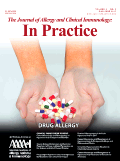
Journal of Allergy and Clinical Immunology-In Practice
Advancing knowledge in allergy and immunology.The Journal of Allergy and Clinical Immunology-In Practice, published by ELSEVIER, stands as a leading platform in the field of allergy and immunology, specifically tailored for practitioners and researchers. With an impressive 2023 Q1 ranking in both the Immunology and Allergy categories, this journal demonstrates a significant impact within the academic community, evidenced by its Scopus rank #41 out of 233 and an impressive percentile rank of 82. The journal focuses on providing advanced studies, clinical findings, and innovative treatment methodologies that address current challenges in allergy and immunology, making it a vital resource for professionals in these fields. With a comprehensive coverage of relevant topics from 2013 to 2024, the journal continues to evolve alongside emerging trends and developments in clinical practice, fostering an environment conducive to scholarly research and application. Although it currently does not offer open access, authors and readers can access a wealth of information and contribute to ongoing dialogues through its robust publication platform.
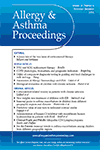
ALLERGY AND ASTHMA PROCEEDINGS
Connecting researchers to enhance patient care.ALLERGY AND ASTHMA PROCEEDINGS, published by Ocean Side Publications Inc, is a vital resource in the fields of Immunology, Allergy, and Pulmonary Medicine. With an impressive trajectory of publication from 1996 to 2024, this journal serves as a platform for cutting-edge research and advancements in the understanding of allergic and asthmatic conditions. Positioned in the Q3 quartile for Immunology and Allergy and Q2 for both Medicine (miscellaneous) and Pulmonary Medicine, the journal exhibits a robust impact within the academic community, boasting Scopus rankings that reflect its significance. The journal offers open access options, allowing for the dissemination of critical findings to a wider audience. Aimed at researchers, healthcare professionals, and students alike, ALLERGY AND ASTHMA PROCEEDINGS addresses the complexities of respiratory diseases and facilitates the sharing of knowledge that is essential to improving patient care and outcomes.